In their rigid enforcement of community standards, New England’s Puritan punishments often often included the bilbo, the cleft stick, the brand, the ear crop and the letter, scarlet and otherwise.
In Massachusetts, New Plymouth, Connecticut and New Haven Colony, the Puritans cared more for moral behavior and clean living than for property rights. They took their laws from the Bible, rather than English precedent. Consequently, Puritan punishments tended to be doled out less for larceny and more for blasphemy, drunkenness, fornication and smoking.
Puritan Punishments
The Puritans never incarcerated prisoners for a long time. They accepted capital punishment, though, for 12 crimes, including blasphemy, counterfeiting and witchcraft.
Puritan law recognized the principle that no one should be deprived of life, liberty or property without due process. They also explicitly limited government power. Puritan law prohibited unlawful search and seizure, double jeopardy and compulsory self-incrimination. It also guaranteed bail, grand jury indictment and trial by jury.
Rhode Island, though, proved an exception, taking nearly all of its laws from English precedent.
The Bilbo
The first Puritans took with them the bilbo as a way to punish sinners and lawbreakers. According to Alice Morse Earle, the Spanish named it after its place of origin — Bilboa, Spain. They shipped bilboas with the Spanish Armada in anticipation of all the English prisoners they would have to shackle.
They were a simple but effective restraint; a long heavy bolt or bar of iron having two sliding shackles, something like handcuffs, and a lock. In these shackles were thrust the legs of offenders or criminals, who were then locked in with a padlock. Sometimes a chain at one end of the bilboes attached both bilboes and prisoner to the floor or wall.
In 1629, the carousing, fun-loving colonist Thomas Morton had the effrontery to erect a Maypole. He did it right under the noses of the Pilgrims at Plymouth Colony. Myles Standish led a raiding party, arrested Morton and put him in the bilbo.
The Indians, reported Morton, came and looked at him and wondered what it all meant.
The Puritans eventually replaced bilboes with wooden stocks.
The Scarlet Letter
Nathaniel Hawthorne enshrined in literature the Puritan punishment of ordering a sinner to wear a scarlet ‘A.’ But the Puritans had other letters of shame. In 1656 a woman received a sentenced to be whipped at Taunton and Plymouth, fined and forever ‘to have a Roman B cutt out of ridd (red) cloth & sewed to her vper garment on her right arm in sight.’ The ‘B’ stood for blasphemy.
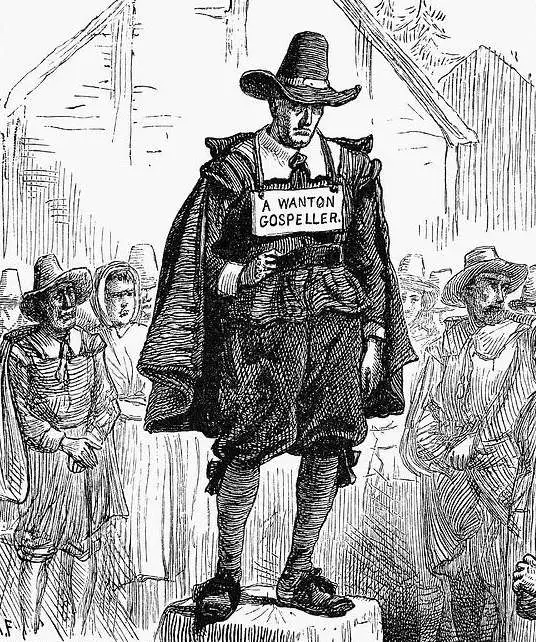 William Bacon in 1636 had to spend an hour in the pillory wearing in public view a great ‘D’ — for drunkenness.
William Bacon in 1636 had to spend an hour in the pillory wearing in public view a great ‘D’ — for drunkenness.
In 1633, Robert Coles had to stand with a white sheet of paper on his back with the word ‘Drunkard’ written in ‘great letters’ on it, and stand as long as the court ordered ‘for abuseing himself shamefully with drinke.’ The next year, Coles received a more severe sentence: He had to wear a D made of red cloth on a white background for a year.
Massachusetts magistrates reproved anyone who interrupted a preacher during worship. If they did it twice, they had to pay a fine of five pounds, stand on a block four feet high with a sign in capital letters, ‘WANTON GOSPELLER.’
Wickednesse
Puritan punishments in Connecticut were even tougher. In 1650 the general court tried a man in Hartford for ‘contemptuous carriages’ against the church and minister. He had to stand upon a four-foot high block or stool on Lecture Day with a paper fixed on his breast with the words, ‘AN OPEN AND OBSTINATE CONTEMNNER OF GOD’S HOLY ORDINANCES.’ The purpose of his punishment: so others would ‘fear and be ashamed of breakinge out in like wickednesse.’
When Joan Andrews of York, Maine, sold a firkin of butter with stones in it, she had to stand in a public place. She also had a description of her cheating ‘written in capitall letters and pinned upon her forehead.’ Around 1650 Ann Boulder of Boston stood in irons for a half hour with a sign pinned to her that said, “PUBLICK DESTROYER OF PEACE.”
Cleft Stick
Slanderers, scolds and liars were liable to have a cleft stick – a stick split at the end – put onto their tongues while they stood in a public place.
In 1639 in Salem, Mass., two men got drunk and lied about it. They had to pay fines and stand by the meeting house door with a paper on their hats ‘subscribed for gross premeditated lyinge.’ Authorities put cleft sticks on their tongues.
Men, women and even children could have their tongues ‘thrust into the cleft stick.’ In Providence, teachers used a ‘whispering stick’ as a punishment for whispering. Disciplinarians tied a wooden gag with holes in it onto a child’s tongue. Many children had a cleft stick placed on their tongues ‘for ill words or untimely words in school,’ wrote Earle.
Branding and Maiming
Branding and maiming were common Puritan punishments, especially for Quakers.
Quaker George Bishop gave an account of a Quaker’s treatment in New Haven in New England Judged by the Spirit of the Lord.
The Drum was Beat, the People gather’d, Norton was fetch’d and stripp’d to the Waste, and set with his back to the Magistrates, and given in their View Thirty-six cruel Stripes with a knotted cord, and his hand made fast in the Stocks where they had set his Body before, and burn’d very deep with a Red-hot Iron with H. for Heresie.
Massachusetts banned Quakers, and the Puritan punishments for returning were painful. Colonial records described in 1657 what should happen to Quakers who came back:
A Quaker if male for the first offense shall have one of his ears cut off; for the second offense have his other eare cutt off; a woman shalbe severely whipt; for the third offense they, he or she, shall have their tongues bored through with a hot iron.
Offenders could try to have their Puritan punishments mitigated by seeking the intervention of clergy. A counterfeiter in Salem, condemned to death, pleaded for a clergyman to help him. As a result, he got only a brand on his hand.
Mary Dyer received the most extreme of the Puritan punishments for returning to the colony after banishment. She was hanged in Boston in 1660.
Abel Buell
Abel Buell of Killingworth, Conn., got caught minting money on homemade plates. Historian John Warner Barber described the price he paid:
The tip only of Buell’s ear was cropped off: it was held on his tongue to keep it warm till it was put on the ear again, where it grew on. He was branded on the forehead as high up as possible. This was usually done by a hot iron in the form of a letter designating the crime, which was held on the forehead of the criminal till he could say the words “God save the king.”
Buell later printed the first map of the United States of America.
This story about Puritan punishments was updated in 2022.
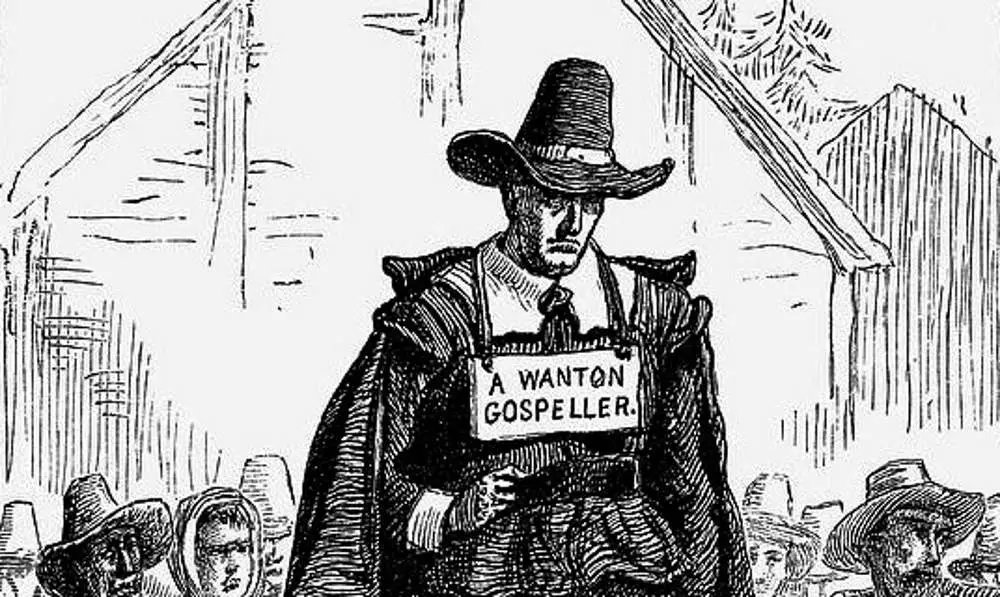
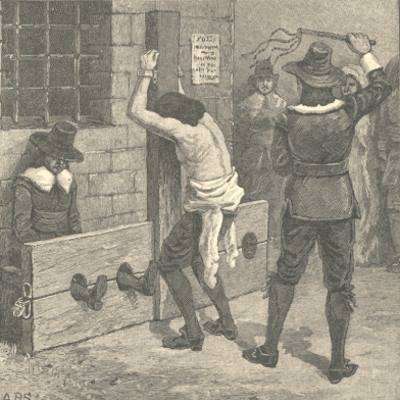
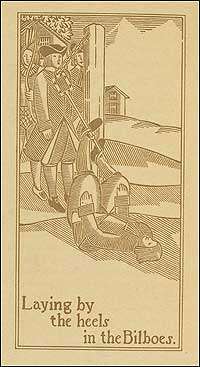
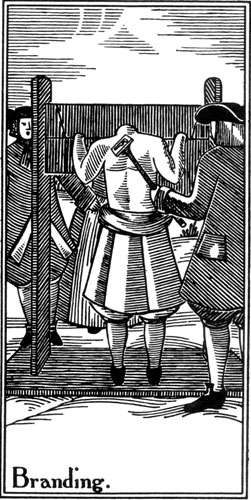

33 comments
Really liked article about ship All alone. Here on Long Island many rum runners put in.
[…] The harshest laws against the Quakers were repealed, but tensions continued between them and the Puritans. The Puritans viewed the Quakers as dangerous intruders, and the Quakers did not forget the way they’d been treated by the Puritans: whipped, branded, mutilated and hanged. […]
[…] to keep order in their cities on hills. The Massachusetts Bay Puritans eventually threw him into prison, but in the end Capt. Barefoot won out with a little help from King Charles […]
[…] to keep order in their cities on hills. The Massachusetts Bay Puritans eventually threw him into prison, but in the end Capt. Barefoot won out with a little help from King Charles […]
[…] to keep order in their cities on hills. The Massachusetts Bay Puritans eventually threw him into prison, but in the end Capt. Barefoot won out with a little help from King Charles […]
[…] was always a little different than its Puritan neighbors. Perhaps that has to do with it founder, John Oldham. He was kicked out of Plymouth for […]
[…] The Massachusetts Puritans passed a law forbidding a person or town to entertain guests for more than three weeks without special permission. In Rhode Island, Providence and Portsmouth required a vote of the town to let a newcomer stay. New Haven appointed a committee to evaluate strangers who were not only denied land but whipped and sent out of town. […]
[…] who dethroned King Charles I (and lopped off his head) saw it as an ungodly papist rite. Puritans had punishments a few of today’s folks might like—the stocks, public whippings, branding, but not just to […]
[…] The wisest course was to simply apologize when the tithingman corrected your behavior, because often they had the power to arrest someone or put them in the stocks if they were unruly. […]
[…] first glance, it's hard to imagine William Read running afoul of Puritan justice. Read came to New England in 1635 as part of a group of colonists led by Rev. Joseph Hull. He first […]
[…] grows sweaty in the heat and caked in the grime of the town square. The use of the stocks would be a return to America’s Puritan roots, and so it would be a “teachable moment” for both the offenders and for young children eager to […]
[…] grows sweaty in the heat and caked in the grime of the town square. The use of the stocks would be a return to America’s Puritan roots, and so it would be a “teachable moment” for both the offenders and for young children […]
[…] grows sweaty in the heat and caked in the grime of the town square. The use of the stocks would be a return to America’s Puritan roots, and so it would be a “teachable moment” for both the offenders and for young children […]
[…] the Anglican Church. They wanted to return to a purer form of religion that stressed the need for a more pious life and a more personal relationship with God that put ministers on the same footing as everyone […]
[…] Puritan eyes, crimes against their religion were far worse than crimes against property. They punished blasphemy with the whip, the Bilbo, the brand or the ear […]
[…] His order backfired. A large crowd appeared outside his house with British hostages in tow. Shirley confronted the crowd, rescued the hostages and took them inside. That further inflamed the mob. They had with them the sheriff's deputy they'd taken, and beat him in Shirley's courtyard before putting him in the stocks. […]
[…] Historian John Warner Barber in 1836 described the rest of his punishment: […]
[…] Connecticut, Peters characterized bundling as ‘certainly innocent, virtuous and prudent, or the Puritans would not have permitted it to prevail among their […]
I am using this article for my highschool article on puritan crime punishment and I couldn’t find who published this article. Please get back to me soon and thanks!
[…] write. Without an affiliation with the Pilgrims, Oldham and others like him agreed to abide by the Pilgrims' laws. They would pay taxes and participate in defending the burgeoning colony. They would also refrain from […]
[…] often ordered harsh punishments for the guilty party in a divorce: fines, whipping or time in the stocks. The guilty party was also […]
[…] had set them apart to create a shining city on a hill. And they embraced the values of their Puritan forebears: hard work, thrift, culture and […]
[…] shocking infanticides (if Sarah Simpson was lying) no doubt resulted from the women’s fears of harsh punishment for having extramarital sex. They probably thought concealing their pregnancies a matter of […]
[…] may also be interested in this story about Puritan punishments here. This story about the Puritan dress code was updated in […]
[…] This story about the Old Deluder Satan Act was updated in 2018. If you'd like to read more about Puritan beliefs, check out the story about Puritan punishments here. […]
[…] court fined him for allowing drinking and shuffleboard on Sunday, for overcharging his customers and for letting his customers get drunk. The court also committed […]
[…] Puritans responded by cruelly punishing Quakers. They whipped them, branded them, cut off their ears, bored holes through their tongues and […]
[…] the player backwards. Events such as failing to honor the Sabbath would send the player to the 'Whipping Post.' The goal of the game was to reach the 'Mansion of Bliss,' heaven. ('Mansion of Bliss,' by the […]
[…] judges, she wrote, issued strict sentences, frequently ordering whippings for […]
[…] Oct. 9, 1635, the General Court ordered Roger Williams banished for spreading 'diverse, new and dangerous […]
[…] player backwards. Events such as failing to honor the Sabbath would send the player to the ‘Whipping Post.’ The goal of the game was to reach the ‘Mansion of Bliss,’ […]
[…] robbed another store, for which he received 20 lashes and was clapped in irons. But he had hidden some tools in his clothes and escaped. Tufts made it a point to accumulate an […]
[…] player backwards. Events such as failing to honor the Sabbath would send the player to the ‘Whipping Post.’ The goal of the game was to reach the ‘Mansion of Bliss,’ heaven. […]
Comments are closed.